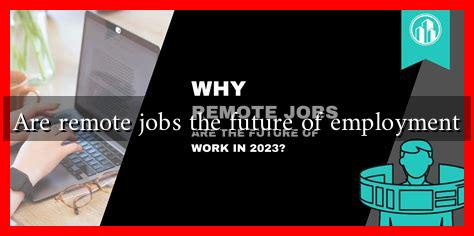-
Table of Contents
Are Remote Jobs the Future of Employment?
In recent years, the landscape of employment has undergone a significant transformation, with remote jobs emerging as a prominent trend. The COVID-19 pandemic accelerated this shift, forcing companies and employees to adapt to a new way of working. As we move forward, the question arises: are remote jobs the future of employment? This article explores the benefits, challenges, and potential of remote work, supported by relevant examples and statistics.
The Rise of Remote Work
Remote work is not a new concept; however, its adoption has skyrocketed in the last few years. According to a report by FlexJobs, remote work has increased by 159% since 2005, with a significant surge during the pandemic. In 2020 alone, 42% of the U.S. workforce was working remotely full-time, a stark contrast to just 24% in 2019.
Benefits of Remote Jobs
Remote jobs offer numerous advantages for both employees and employers. Here are some key benefits:
- Flexibility: Remote work allows employees to create their own schedules, leading to a better work-life balance.
- Cost Savings: Employees save on commuting costs, work attire, and meals, while companies can reduce overhead expenses related to office space.
- Access to a Global Talent Pool: Employers can hire talent from anywhere in the world, increasing diversity and expertise within their teams.
- Increased Productivity: Many studies suggest that remote workers are often more productive due to fewer distractions and a personalized work environment.
Challenges of Remote Work
Despite its many benefits, remote work also presents challenges that need to be addressed:
- Communication Barriers: Remote teams may struggle with communication, leading to misunderstandings and decreased collaboration.
- Isolation: Employees may feel lonely or disconnected from their colleagues, which can impact morale and job satisfaction.
- Work-Life Boundaries: The blurring of lines between work and personal life can lead to burnout if not managed properly.
- Technology Dependence: Remote work relies heavily on technology, which can be a barrier for some employees and may lead to technical issues.
Case Studies: Companies Embracing Remote Work
Several companies have successfully adopted remote work policies, showcasing its viability as a long-term employment model:
- GitLab: This all-remote company has over 1,300 employees across 67 countries. GitLab’s success is attributed to its strong emphasis on communication and documentation, ensuring that all team members are aligned and informed.
- Buffer: Buffer has been a remote-first company since its inception. The company prioritizes transparency and employee well-being, offering flexible schedules and mental health resources.
- Zapier: With a fully remote workforce, Zapier has thrived by fostering a culture of trust and accountability. The company emphasizes asynchronous communication, allowing employees to work at their own pace.
The Future of Remote Work
As we look to the future, several trends indicate that remote work is here to stay:
- Hybrid Models: Many companies are adopting hybrid work models, allowing employees to split their time between the office and remote work.
- Investment in Technology: Organizations are increasingly investing in tools and platforms that facilitate remote collaboration and communication.
- Focus on Employee Well-being: Companies are recognizing the importance of mental health and work-life balance, leading to more supportive remote work policies.
Conclusion
In conclusion, remote jobs are not just a temporary solution but a significant shift in the future of employment. The benefits of flexibility, cost savings, and access to a global talent pool make remote work an attractive option for many. However, challenges such as communication barriers and isolation must be addressed to ensure long-term success. As companies continue to adapt and innovate, it is clear that remote work will play a crucial role in shaping the future of the workforce.
For more insights on remote work trends and statistics, you can visit FlexJobs.

